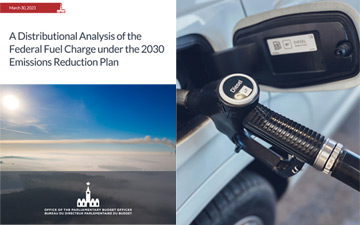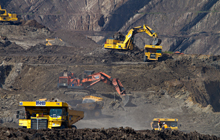Carbon Tax: Correction demanded for 'big error' in carbon price report

A recent PBO report overestimated the real costs of the carbon tax because it mistakenly included the impact of industrial carbon prices on individual Canadians
VANCOUVER, May 29, 2024 – The Parliamentary Budget Officer made an error in its carbon-pricing reports that are frequently cited in the Conservative Party's “axe the tax” attacks, and the Liberals want a more prominent correction issued.
The PBO quietly published a note on its website on April 17, admitting its economic analyses of the consumer carbon price in 2022 and 2023 erroneously included the impact of the industrial carbon price, too.
Liberal MP Ryan Turnbull, parliamentary secretary for the Finance Minister, wrote to the PBO requesting a “more detailed public correction,” adding that “correcting the record on your analysis of the fuel charge is necessary to maintain the integrity of your office.”
“To be honest, it's irresponsible,” said Chris Bataille, energy and climate policy analyst, in a phone interview with Canada’s National Observer. “It should be more prominent.”
The PBO plans to publish an updated analysis in the fall.
The PBO’s reports purported to analyze the impacts of the consumer fuel charge and rebates and concluded the carbon price’s impact on economic growth and jobs could mean up to 80 per cent of families won’t break even with rebates. The federal Conservatives seized on this talking point to counter the federal government’s assertion that eight out of 10 households will receive more money back through fuel rebates than they are taxed. For the last year, Conservative Leader Pierre Poilievre and his caucus have cited the PBO report as a reason to “axe the tax.”
But Poilievre has not been clear on whether a Conservative government would also axe the industrial pricing system.
By including the industrial system in the analysis, Turnbull and experts on carbon pricing say the results are skewed and do not represent what the PBO initially set out to study.
“By incorporating the impacts of the industrial Output-based Pricing System (OBPS) for industrial polluters, the economic impacts projected in your report certainly overestimate the real costs of the fuel charge,” wrote Turnbull.
This is a “big error,” said Bataille, an adjunct research fellow at the Columbia University Center on Global Energy Policy, in an interview with Canada’s National Observer.
“If a private consulting firm was responsible for that error, it would not be doing that work again,” he said. Bataille was a lead author for the Intergovernmental Panel on Climate Change’s Sixth Assessment Report.
“The numbers that are being bandied about about the effects of the fuel levy are drastically overestimated at this point in time” he added.
Industrial pricing has a potentially larger economic effect because it affects large, critical industries — such as oil and gas, mining, cement and pulp and paper — compared to the fuel charge on individuals. While the levy for individuals certainly has implications for the economy, they are not nearly as large because the coverage is more on the consumer, said Trevor Tombe, a professor of economics at the University of Calgary, in an interview with Canada’s National Observer.
Even before this revelation, the PBO’s modeling was criticized by the environmental community and many researchers, because it only models the cost of environmental policies and not the benefits associated with limiting global warming and its damages.
Nicholas Rivers, a carbon price expert and professor at the University of Ottawa, said it is concerning how long the PBO’s mistaken analysis has been circulated and how influential it has been in Canadian politics. But he isn’t shocked there was a mistake in the model.
“There's always the concern that the long computer code that someone had to write had flaws,” said Rivers in an interview with Canada’s National Observer.
All these models make a lot of assumptions and Rivers thinks they shouldn’t be treated as definitive, but rather, that many different models should be run to better triangulate and understand the impacts of different policies.
This situation “really reinforces that you should never hang your hat on a single paper or a single piece of analysis as though it is the end of the story,” said Tombe. “This is a complicated policy that requires real, rigorous research from lots of independent entities.”
The PBO told Canada’s National Observer it is not clear how the results of its carbon price analyses would be affected if the output-based pricing system was excluded.
The industrial pricing system is going to account for a large chunk of Canada’s greenhouse gas emission reductions by 2030, according to analysis done by the Canadian Climate Institute.
Natasha Bulowski is a Local Journalism Initiative Reporter with Canada's National Observer. With files from the Canadian Press.







(0) Comments